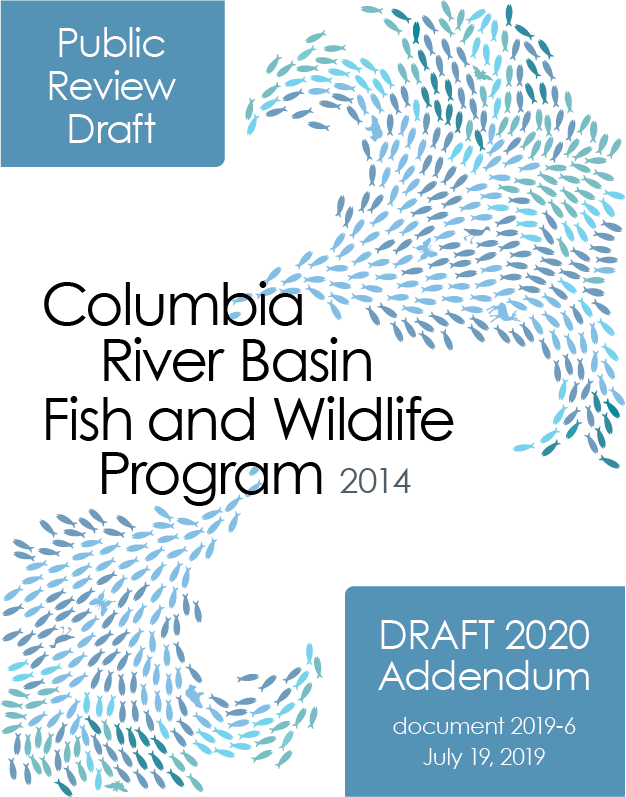Council Seeks Comments on Draft Addendum to Fish and Wildlife Program
- July 17, 2019
- John Harrison
At its July Council meeting, the Northwest Power and Conservation Council approved for public comment a draft addendum to its 2014 Columbia River Basin Fish and Wildlife Program. Public comments on the addendum will be accepted through October 18, 2019. Public hearings to accept comment will be held beginning in mid-August. Comments will also be accepted in writing.
The draft addendum is considered part of the 2014 Program, which would remain in effect.
The 1980 Northwest Power Act directs the Council to prepare, adopt, and periodically review a Columbia River Basin fish and wildlife program to mitigate the impacts of hydropower dams on fish, wildlife, and related spawning grounds and habitat. The Power Act also directs the federal Bonneville Power Administration to pay for projects that implement the Council’s program.
The Power Act directs the Council to begin the program review by requesting recommendations and gives particular emphasis to recommendations from state and federal fish and wildlife agencies and Indian tribes. In its May 2018 request, the Council posed a series of questions to help focus the recommendations. The Council received a total of 51 sets of recommendations by the deadline in December 2018. After reviewing the recommendations, and public comments on them, the Council determined that an addendum, and not a complete rewrite, would best serve the needs of the program over the next five years.
Some of the key elements of the addendum include:
- Program performance and adaptive management: This part of the addendum describes what the Council and others will do over the next few years to evaluate the program’s performance and apply that evaluation to improve program implementation. Section A includes a reorganization and elaboration of the program’s goals, objectives, and strategy performance indicators as needed for this task. It also includes a discussion of how the Council intends to use these goals, objectives, and indicators to assess program performance and improve implementation.
- Program goals, objectives, and performance indicators: Program goals, objectives, and performance indicators have been refined in the draft addendum using many sources including the provisional goals developed by the Columbia Basin Partnership Taskforce under NOAA’s Marine Fisheries Advisory Committee. Additional goals for resident fish, wildlife, and ecosystem function are included in the addendum. The Council proposes to assess program performance by reporting regularly on progress toward achieving the goals.
- Climate change: The addendum calls on the Council and others to consider the implications of climate change in all aspects of the program – program planning, project development, and project and program implementation and assessments. The Council will establish a standing science-policy forum on climate change to help the Council and others better understand the implications of climate change and better inform regional power and fish and wildlife decisions.
- Mitigating for salmon and steelhead impacts of Chief Joseph and Grand Coulee dams: This part of the Columbia River Basin has suffered the loss of fish and wildlife species directly due to hydropower development at a scale at least comparable to, and in most cases greater than, other areas of the basin. The addendum recommends that Bonneville begin a comprehensive effort over the next five years to intensify, expand, and then sustain the mitigation effort for this part of the basin.
- Better understanding ocean impacts: In recent years, the annual information delivered by the program’s ocean strategy and ocean research effort has become especially important, with unusual ocean conditions resulting in increased ocean temperatures, changes in food sources, changing predator-prey relationships, and subsequent reductions in survival for many stocks. Monitoring and research actions that generate a basic, important level of information about salmon survival in the ocean are a core part of the program and need to be preserved and adequately funded.
- Predator Management: Everyone involved in the program must work together to continue developing a more effective systemwide, ecosystem-based approach for assessing and addressing the impacts of fish, avian, and sea lion predation on salmon, steelhead and other fish species important to the program.
- Budget: The addendum recommends that the Council, in collaboration with Bonneville and others, work to ensure that any reductions in program expenditures are 1) aimed at finding efficiencies without sacrificing productive work; 2) remain scientifically valid; and 3) ensure that cost-management efforts are shared equitably throughout the program.




